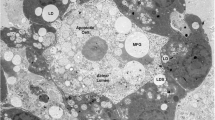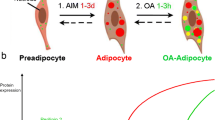Abstract
Mammary epithelial cells secrete lipids by an envelopment process that produces lipid droplets coated by membranes derived from the plasma membrane and possibly secretory vesicles. This secretion process, which resembles viral budding, is hypothesized to be mediated by specific interactions between molecules on the surface of intracellular lipids and membrane elements of the cell. Multiple lines of evidence indicate that milk lipid secretion occurs through a tripartite complex between the integral transmembrane protein, butyrophilin (BTN); the soluble metabolic enzyme, xanthine oxidoreductase (XOR); and the lipid droplet surface protein, adipophilin (ADPH). However, topological evidence from freeze-fracture replica immunolabelling (FRIL) challenge this model and suggests that milk lipid secretion is mediated by butyrophilin alone. Advances in our understanding of the molecular, structural, and functional properties of these proteins now make it possible to understand the physiological functions of each of these molecules in detail and to identify the specific molecular determinants that mediate milk lipid secretion.





Similar content being viewed by others
References
Robenek H, Hofnagel O, Buers I, Lorkowski S, Schnoor M, Robenek MJ, Heid H, Troyer D, Severs NJ. Butyrophilin controls milk fat globule secretion. Proc Natl Acad Sci USA 2006;103:10385–10390.
McManaman JL, Reyland ME, Thrower EC. Secretion and fluid transport mechanisms in the mammary gland: comparisons with the exocrine pancreas and the salivary gland. J Mammary Gland Biol Neoplasia 2006;11:249–268.
Bargmann W, Knoop A. Morphology of lactation; light & electro-microscopic studies on the mammary glands of rats. Z Zellforsch Mikrosk Anat 1959;49:344–388.
Wooding FB. Formation of the milk fat globule membrane without participation of the plasmalemma. J Cell Sci 1973;13:221–235.
Wooding FBP. Comparative mammary fine structure. In: Peaker M, editor. Comparative Aspects of Lactation. London: Academic; 1977. p. 1–41.
Murphy DJ. The biogenesis and functions of lipid bodies in animals, plants and microorganisms. Prog Lipid Res 2001;40:325–438.
Brasaemle DL. The perilipin family of structural lipid droplet proteins: stabilization of lipid droplets and control of lipolysis. J Lipid Res 2007.
Tauchi-Sato K, Ozeki S, Houjou T, Taguchi R, Fujimoto T. The surface of lipid droplets is a phospholipid monolayer with a unique Fatty Acid composition. J Biol Chem 2002;277:44507–44512.
Londos C, Brasaemle DL, Schultz CJ, Segrest JP, Kimmel AR. Perilipins, ADRP, and other proteins that associate with intracellular neutral lipid droplets in animal cells. Semin Cell Dev Biol 1999;10:51–58.
Wu CC, Howell KE, Neville MC, Yates JR 3rd, McManaman JL. Proteomics reveal a link between the endoplasmic reticulum and lipid secretory mechanisms in mammary epithelial cells. Electrophoresis 2000;21:3470–3482.
Stein O, Stein Y. Lipid synthesis, intracellular transport, storage, and secretion. I. Electron microscopic radioautographic study of liver after injection of tritiated palmitate or glycerol in fasted and ethanol-treated rats. J Cell Biol 1967;33:319–339.
Novikoff AB, Novikoff PM, Rosen OM, Rubin CS. Organelle relationships in cultured 3T3-L1 preadipocytes. J Cell Biol 1980;87:180–196.
Blanchette-Mackie EJ, Dwyer NK, Barber T, Coxey RA, Takeda T, Rondinone CM, Theodorakis JL, Greenberg AS, Londos C. Perilipin is located on the surface layer of intracellular lipid droplets in adipocytes. J Lipid Res 1995;36:1211–1226.
Robenek H, Hofnagel O, Buers I, Robenek MJ, Troyer D, Severs NJ. Adipophilin-enriched domains in the ER membrane are sites of lipid droplet biogenesis. J Cell Sci 2006;119:4215–4224.
Pol A, Luetterforst R, Lindsay M, Heino S, Ikonen E, Parton RG. A caveolin dominant negative mutant associates with lipid bodies and induces intracellular cholesterol imbalance. J Cell Biol 2001;152:1057–1070.
Athenstaedt K, Zweytick D, Jandrositz A, Kohlwein SD, Daum G. Identification and characterization of major lipid particle proteins of the yeast Saccharomyces cerevisiae. J Bacteriol 1999;181:6441–6448.
Brasaemle DL, Dolios G, Shapiro L, Wang R. Proteomic analysis of proteins associated with lipid droplets of basal and lipolytically stimulated 3T3-L1 adipocytes. J Biol Chem 2004;279:46835–46842.
Liu P, Ying Y, Zhao Y, Mundy DI, Zhu M, Anderson RG. Chinese hamster ovary K2 cell lipid droplets appear to be metabolic organelles involved in membrane traffic. J Biol Chem 2004;279:3787–3792.
Hollmann KH. Cytology and fine structure of the mammary gland. In: Larson BL, Smith VR, editors. Lactation. New York: Academic; 1974. p. 3–95.
Wooding FB. The mechanism of secretion of the milk fat globule. J Cell Sci 1971;9:805–821.
Jarasch ED, Bruder G, Keenan TW, Franke WW. Redox constituents in milk fat globule membranes and rough endoplasmic reticulum from lactating mammary gland. J Cell Biol 1977;73:223–241.
Ladinsky MS, Mastronarde DN, McIntosh JR, Howell KE, Staehelin LA. Golgi structure in three dimensions: functional insights from the normal rat kidney cell. J Cell Biol 1999;144:1135–1149.
Mather IH, Jack LJ, Madara PJ, Johnson VG. The distribution of MUC1, an apical membrane glycoprotein, in mammary epithelial cells at the resolution of the electron microscope: implications for the mechanism of milk secretion. Cell Tissue Res 2001;304:91–101.
Mather IH, Keenan TW. Origin and secretion of milk lipids. J Mammary Gland Biol Neoplasia 1998;3:259–273.
Lu X, Gruia-Gray J, Copeland NG, Gilbert DJ, Jenkins NA, Londos C, Kimmel AR. The murine perilipin gene: the lipid droplet-associated perilipins derive from tissue-specific, mRNA splice variants and define a gene family of ancient origin. Mamm Genome 2001;12:741–749.
Brasaemle DL, Barber T, Wolins NE, Serrero G, Blanchette-Mackie EJ, Londos C. Adipose differentiation-related protein is an ubiquitously expressed lipid storage droplet-associated protein. J Lipid Res 1997;38:2249–2263.
Heid HW, Moll R, Schwetlick I, Rackwitz HR, Keenan TW. Adipophilin is a specific marker of lipid accumulation in diverse cell types and diseases. Cell Tissue Res 1998;294:309–321.
Russell TD, Palmer CA, Orlicky DJ, Fischer A, Rudolph MC, Neville MC, McManaman JL. Cytoplasmic lipid droplet accumulation in developing mammary epithelial cells: roles of adipophilin and lipid metabolism. J Lipid Res 2007;48:1463–1475.
Gao J, Serrero G. Adipose differentiation related protein (ADRP) expressed in transfected COS-7 cells selectively stimulates long chain fatty acid uptake. J Biol Chem 1999;274:16825–16830.
Imamura M, Inoguchi T, Ikuyama S, Taniguchi S, Kobayashi K, Nakashima N, Nawata H. ADRP stimulates lipid accumulation and lipid droplet formation in murine fibroblasts. Am J Physiol Endocrinol Metab 2002;283:E775–783.
McManaman JL, Zabaronick W, Schaack J, Orlicky DJ. Lipid droplet targeting domains of adipophilin. J Lipid Res 2003;44:668–673.
Targett-Adams P, Chambers D, Gledhill S, Hope RG, Coy JF, Girod A, McLauchlan J. Live cell analysis and targeting of the lipid droplet-binding adipocyte differentiation-related protein. J Biol Chem 2003;278:15998–16007.
Listenberger LL, Ostermeyer-Fay AG, Goldberg EB, Brown WJ, Brown DA. Adipocyte differentiation-related protein reduces lipid droplet association of adipose triglyceride lipase and slows triacylglycerol turnover. J Lipid Res 2007 (In Press).
Banghart LR, Chamberlain CW, Velarde J, Korobko IV, Ogg SL, Jack LJ, Vakharia VN, Mather IH. Butyrophilin is expressed in mammary epithelial cells from a single-sized messenger RNA as a type I membrane glycoprotein. J Biol Chem 1998;273:4171–4179.
McManaman JL, Palmer CA, Wright RM, Neville MC. Functional regulation of xanthine oxidoreductase expression and localization in the mouse mammary gland: evidence of a role in lipid secretion. J Physiol 2002;545:567–579.
Franke WW, Heid HW, Grund C, Winter S, Freudenstein C, Schmid E, Jarasch ED, Keenan TW. Antibodies to the major insoluble milk fat globule membrane-associated protein: specific location in apical regions of lactating epithelial cells. J Cell Biol 1981;89:485–494.
Stryer L. Biochemistry, 3rd ed. New York: W.H. Freeman; 1988.
Bray RC. Molybdenum iron-sulfur flavin hydroxylases and related enzymes. In: Boyer PD, editor. The Enzymes. New York: Academic; 1975. p. 299–419.
McManaman JL, Neville MC, Wright RM. Mouse mammary gland xanthine oxidoreductase: purification, characterization, and regulation. Arch Biochem Biophys 1999;371:308–316.
Kurosaki M, Zanotta S, Calzi ML, Garattini E, Terao M. Expression of xanthine oxidoreductase in mouse mammary epithelium during pregnancy and lactation: Regulation of gene expression by glucocorticoids and prolactin. Biochem J 1996;319:801–810.
Vorbach C, Scriven A, Capecchi MR. The housekeeping gene xanthine oxidoreductase is necessary for milk fat droplet enveloping and secretion: gene sharing in the lactating mammary gland. Genes Dev 2002;16:3223–3235.
Ogg SL, Weldon AK, Dobbie L, Smith AJ, Mather IH. Expression of butyrophilin (Btn1a1) in lactating mammary gland is essential for the regulated secretion of milk-lipid droplets. Proc Natl Acad Sci USA 2004;101:10084–10089.
McManaman JL, Palmer CA, Anderson S, Schwertfeger K, Neville MC. Regulation of milk lipid formation and secretion in the mouse mammary gland. Adv Exp Med Biol 2004;554:263–279.
Russell TD, Palmer CA, Orlicky DJ, Bales ES, Chang BH, Chan L, McManaman JL. Mammary glands of adipophilin-null mice produce an N-terminally truncated form of adipophilin that mediates milk lipid formation and secretion. J Lipid Res 2007;(In Press).
Valivullah HM, Keenan TW. Butyrophilin of milk lipid globule membrane contains N-linked carbohydrates and cross-links with xanthine oxidase. Int J Biochem 1989;21:103–107.
Mondy BL, Keenan TW. Butyrophilin and xanthine oxidase occur in constant molar proportions in milk lipid globule membrane but vary in amount with breed and stage of lactation. Protooplasma 1993;177:32–36.
Ishii T, Aoki N, Noda A, Adachi T, Nakamura R, Matsuda T. Carboxy-terminal cytoplasmic domain of mouse butyrophilin specifically associates with a 150-kDa protein of mammary epithelial cells and milk fat globule membrane. Biochim Biophys Acta 1995;1245:285–292.
Heid HW, Schnolzer M, Keenan TW. Adipocyte differentiation-related protein is secreted into milk as a constituent of milk lipid globule membrane. Biochem J 1996;320(Pt 3):1025–1030.
Waud WR, Rajagopalan KV. The mechanism of conversion of rat liver xanthine dehydrogenase from an NAD+-dependent form (type D) to an O2-dependent form (type O). Arch Biochem Biophys 1976;172:365–379.
Massey V, Schopfer LM, Nishino T, Nishino T. Differences in protein structure of xanthine dehydrogenase and xanthine oxidase revealed by reconstitution with flavin active site probes. J Biol Chem 1989;264:10567–10573.
McManaman JL, Bain DL. Structural and conformational analysis of the oxidase to dehydrogenase conversion of xanthine oxidoreductase. J Biol Chem 2002;277:21261–21268.
Frederiks WM, Marx F. A histochemical procedure for light microscopic demonstration of xanthine oxidase activity in unfixed cryostat sections using cerium ions and a semipermeable membrane technique. J Histochem Cytochem 1993;41:667–670.
Clare DA, Blakistone BA, Swaisgood HE, Horton HR. Sulfhydryl oxidase-catalyzed conversion of xanthine dehydrogenase to xanthine oxidase. Arch Biochem Biophys 1981;211:44–47.
Miura S, Gan JW, Brzostowski J, Parisi MJ, Schultz CJ, Londos C, Oliver B, Kimmel AR. Functional conservation for lipid storage droplet association among Perilipin, ADRP, and TIP47 (PAT)-related proteins in mammals, Drosophila, and Dictyostelium. J Biol Chem 2002;277:32253–32257.
Nielsen RL, Andersen MH, Mabhout P, Berglund L, Petersen TE, Rasmussen JT. Isolation of adipophilin and butyrophilin from bovine milk and characterization of a cDNA encoding adipophilin. J Dairy Sci 1999;82:2543–2549.
Garcia A, Subramanian V, Sekowski A, Bhattacharyya S, Love MW, Brasaemle DL. The amino and carboxyl termini of perilipin a facilitate the storage of triacylglycerols. J Biol Chem 2004;279:8409–8416.
Garcia A, Sekowski A, Subramanian V, Brasaemle DL. The central domain is required to target and anchor perilipin A to lipid droplets. J Biol Chem 2003;278:625–635.
Subramanian V, Garcia A, Sekowski A, Brasaemle DL. Hydrophobic sequences target and anchor perilipin A to lipid droplets. J Lipid Res 2004;45:1983–1991.
Hickenbottom SJ, Kimmel AR, Londos C, Hurley JH. Structure of a lipid droplet protein; the PAT family member TIP47. Structure 2004;12:1199–1207.
Russell T, Fischer A, Beeman N, Freed E, Neville MC, Schaack J. Transduction of the mouse mammary epithelium with adenoviral vectors in vivo. J Virol 2003;77:5801–5809.
Garoff H, Hewson R, Opstelten DJ. Virus maturation by budding. Microbiol Mol Biol Rev 1998;62:1171–1190.
Hurley JH, Emr SD. The ESCRT complexes: structure and mechanism of a membrane-trafficking network. Annu Rev Biophys Biomol Struct 2006;35:277–298.
Morita E, Sundquist WI. Retrovirus budding. Annu Rev Cell Dev Biol 2004;20:395–425.
Lopez-Verges S, Camus G, Blot G, Beauvoir R, Benarous R, Berlioz-Torrent C. Tail-interacting protein TIP47 is a connector between Gag and Env and is required for Env incorporation into HIV-1 virions. Proc Natl Acad Sci USA 2006;103:14947–14952.
Acknowledgments
JLM was supported by NIH grants P01 HD038129 and R01 HD045965. TDR was supported by a UNCF-Merck Graduate Science Initiative fellowship.
Author information
Authors and Affiliations
Corresponding author
Rights and permissions
About this article
Cite this article
McManaman, J.L., Russell, T.D., Schaack, J. et al. Molecular Determinants of Milk Lipid Secretion. J Mammary Gland Biol Neoplasia 12, 259–268 (2007). https://doi.org/10.1007/s10911-007-9053-5
Received:
Accepted:
Published:
Issue Date:
DOI: https://doi.org/10.1007/s10911-007-9053-5




